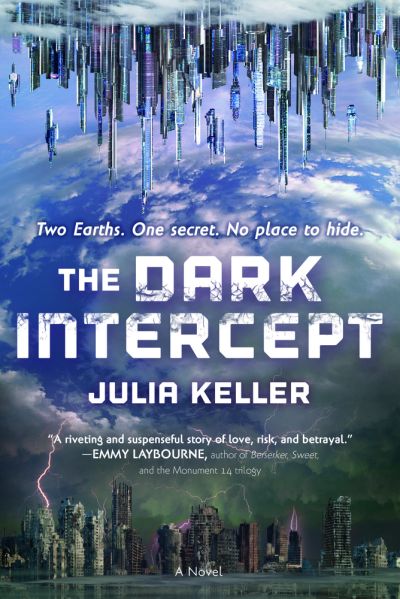Let’s Pretend We Are Not Slaves to Anything
The Dark Intercept
By Julia Keller

4 Dec, 2017
Julia Keller’s 2017 The Dark Intercept is a standalone young-adult SF dystopia.
High above the Earth’s surface, the six floating cities that comprise New Earth offer everything that the war-torn ground level cannot: prosperity, security, and peace. The Intercept is the primary weapon used to keep the chaos of the old world at bay. It reduces any miscreant to a whimpering heap, using the miscreant’s own weaponized emotions.
Sixteen year old Violet Crowley accepts the new world order without question. After all, her father Ogden created it.
Her world is about to fall apart.
The first cracks in her secure life appear in the form of Danny Mayhew’s obsession with Old Earth. Having stocked New Earth with the wealthy and the brilliant, the powers that be are increasingly uninterested in ongoing contact with the surface. Danny’s frequent visits to the surface are unfashionable and dangerous.
Hopelessly infatuated with Danny, Violet is determined to find out why Danny is so intrigued by the surface. She stalks him via computer. And she takes the risk of visiting Old Earth, exposing herself to the dangers of that worn-out, violent world. What she finds there makes her question if she ever knew Danny at all.
The people down on the surface are little threat to those in New Earth, since they cannot reach New Earth. They could be easily incapacitated if they did somehow make their way up into the sky. The true threat is the Rebels of Light, who are determined to overthrow the current order and bring an end to the use of the Intercept. Key to their strategy? A way to block the unblockable, to render themselves immune to the Intercept.
And if that doesn’t work? There’s always the option of attacking Ogden and his family….
~oOo~
This is a comprehensively disappointing work, from the unconvincing worldbuilding, to the un-engaging characters, to the way the various parts of the plot don’t cohere into a single narrative.
Worldbuilding first: the Earth we see has been flattened by war, so even something as mundane as soap is but a distant memory. If there’s anything resembling an economy down on the surface, we never see it. How then did Ogden and his allies build New Earth? Where were its first components built, if there is no manufacturing base?
If the six cities import and export nothing, how do they survive? Is there any kind of economy?
This is an oddly tiny world. This may be due to the fact that New Earth has cut off contact with most of the surface, save for one isolated port. One imagines, then, that there is a privileged minority above in New Earth, and an impoverished majority below on Old Earth. But if that is the case, how is it that New Earth considers transferring the entire surviving population of Old Earth to New Earth? That would suggest that there are no more than six cities worth of survivors down on the surface. Which makes this a tiny world all round.
I also found it odd that the plutocrats should have bothered to build shiny cities in the air when then could have just built hermetically isolated shiny cities on the surface, without having to deal with floating them. I can only guess that all decisions were being made by a handful of people. One of them, Ogden, pushed for floating cities. Still …
Were I an inhabitant of New Earth, I’d be more worried by the fact that the place seems to be an autocracy run according to Ogden’s whims than I would be by the methods he uses to deter dissidence (which are not especially nasty compared to methods now used in real life, let alone the methods seen in other fictional dystopias). His enemies are focused on getting rid of the Intercept. Why don’t they get rid of autocracy?
Violet is a stock character, a naïve young girl with family clout that gives her some agency, as well as power to snoop. Not that she accomplishes all that much with her clout. She finds what she thinks is a Big Secret, but which struck me as ultimately inconsequential.
This book reads as if the author were working to a recipe for yet another young adult dystopia. She assembled all the ingredients, but had no idea how to turn them into a plot, or even how to make them plausible. Not recommended.
The Dark Intercept is available here (Amazon) and here (Chapters-Indigo).
